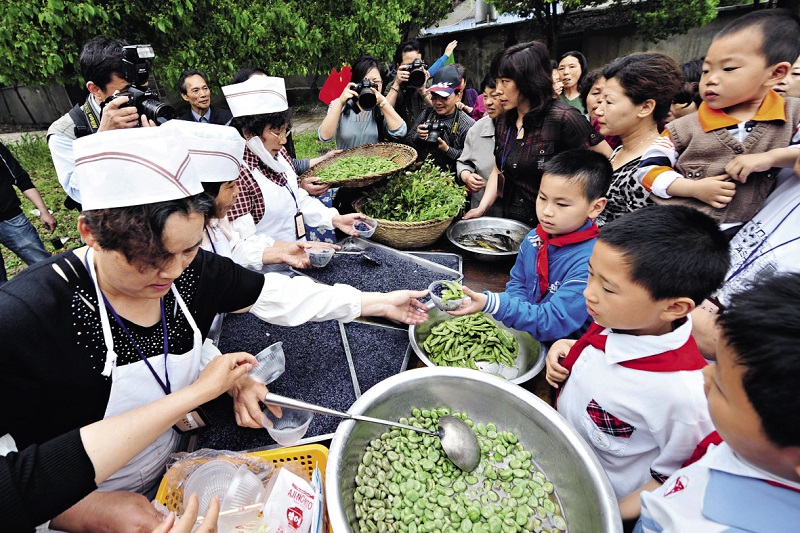
Residents of Banshan in Hangzhou are distributing black rice mixed with poached broad beans and green beans to the local people on May 5, 2010.
One of the Chinese 24 solar terms called Beginning of Summer usually falls each year on a day between May 5 and 7 according to the solar calendar. It signals the end of spring and the start of summer. For centuries, people of the Banshan neighborhood in the city of Hangzhou in east China’s Zhejiang Province celebrate this day with an array of folk events. Each festive activity symbolizes the community’s practical knowledge and wisdom of adapting their day-to-day activities and agricultural production to the changes of their natural environment, and expresses their earnest wishes for a better future.
Having become an important part of folk activities related to the 24 solar terms, the traditions on the Beginning of Summer in Banshan were inscribed on UNESCO’s Representative List of the Intangible Cultural Heritage of Humanity in 2016, and then in 2020, they were included in the fifth batch of national intangible cultural heritages.
Celebrations in Banshan about the beginning of summer usually begin with a ritual parade made up of people dressed up in traditional Chinese clothing, Hanfu, who hold candle-lit lanterns in their hands. The procession sets out from the Chinese Zodiac Park after a spring farewell ceremony is held, and they march to the square west of Banshan Goddess Temple to observe a summer welcome practice.
Following up after the ceremony, locals and visitors participate in a host of time-honored folk activities that take place at the square.
Cooking wild rice: By tradition, on the day that marks the beginning of summer, children go out into the wild in groups to pick broad beans, dig for wild bamboo shoots, catch fish in ravines, and beg for rice and meat from neighboring families. After collecting all the ingredients they need, children set up stone ovens and pots in some corner of a wild field to cook a rice meal by themselves. This fun event is known as cooking wild rice, a centuries-old tradition of praying for good luck and warding off future potential disasters by living a day like a beggar.
Eating black rice: During the few days leading up to the beginning of the summer, residents of the Banshan neighborhood begin busying themselves with cooking black rice by mixing glutinous rice and the juice of grounded fresh-picked sea bilberry leaves. Black rice culture dates back to the Tang Dynasty (618-907) when Chinese regarded it as a reliable source of abundant nutrients. Hangzhou people also believe that children who eat black rice at the beginning of the summer will not get bitten by insects and therefore will be strong and fit throughout the summer. Every year, no matter how much rice is prepared in Banshan, the supply is never able to meet the demands.
Weighing people: In order to gear up for the unbearable heat during summer months, local Hangzhouers developed the amusing tradition of weighing people on a traditional scale on the first day of summer to check the changes in their bodyweight over the previous year. People of all ages are entitled to participate in this activity. The person who presides over the weighing activity reads the results out loud while giving blessings to the participants for good health and safety during the coming summer. It is a festive highlight for a person to sit safely and idly on a cane chair which is hoisted up by a one-meter-long scale, a summertime tailor-made amusing sight. Locals believe that people who weigh themselves on this day will not only have good fortune, but also have a high endurance for heat and guard against weight loss during the coming summer.
Egg fights: Children are undoubtedly captivated by this game. Armed with a boiled egg, each child tries to break the egg of their competitor. Despite being a seemingly easy game, there are rules that should be followed: The pointy end of the egg is the head, while the wider end is the bottom; during an egg fight, egg heads and bottoms can only touch the equivalent part of the other person’s egg. Whoever’s eggshell cracks first is the loser and needs to eat the egg as a punishment. The champion in the game is awarded the title of “Egg King.”
Today, a fair has been included in the celebrations, during which rows of stalls showcase a variety of traditional and modern handicrafts made by craftsmen in Zhejiang Province. Every year the fair attracts streams of visitors to come and get a taste of the local culture.
The mix of local food, games, and cultural elements has given birth to a series of unique customs in Banshan, Hangzhou that are centered on the beginning of summer. Amid joy and laughter, people pray for a peaceful and delightful summer.